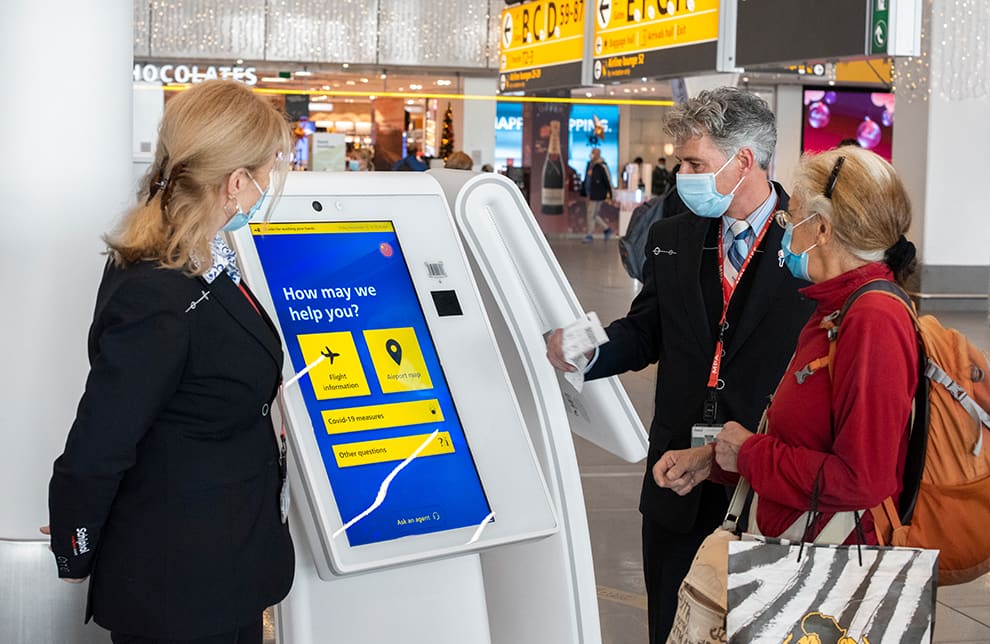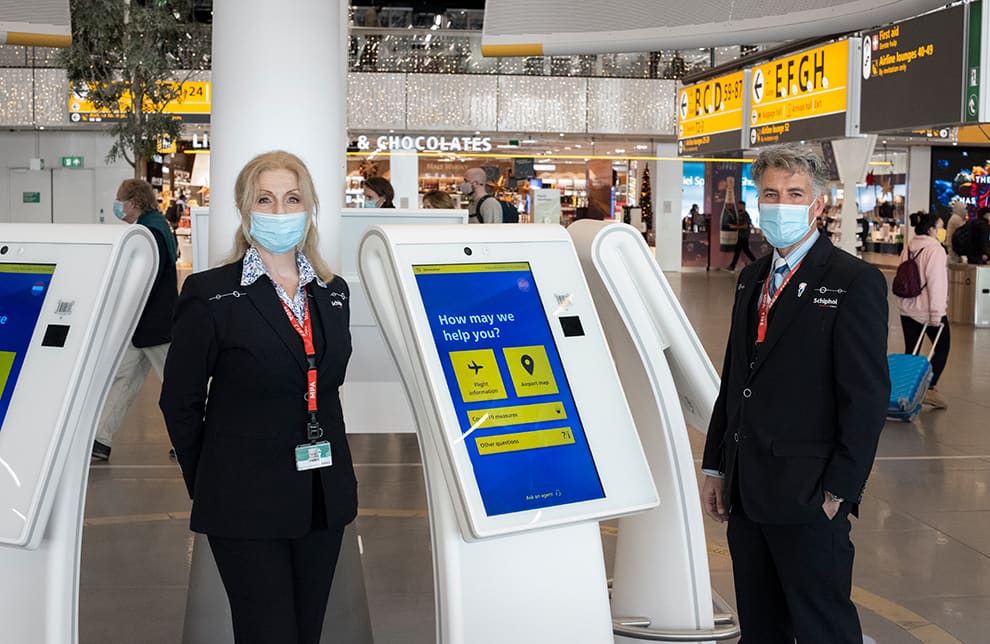Side by Side - winter 2020: 'We’re there to help passengers'
Miriam Cornelissen is a Mobile Personal Assistant (MPA), whose job is to assist passengers. During the coronavirus pandemic, her assistance has been invaluable. 'The world can change so quickly,' says Miriam. She has had a hectic but extraordinary time.

When did you start in the role of MPA?
'In December last year. Before that, I worked at the Information Desk. Last year, Amsterdam Airport Schiphol set up the SSUs, or Self-Service Units. I thought it was really innovative, the idea that everyone in the airport could use these SSUs. The SSUs are spread all over Schiphol, and passengers can use them to find information on flights, gates, shops and restaurants. If passengers need more information and/or help, they can click "ask an agent", which will launch a live video call with us. Through a video call, we can assess whether someone needs more help, and if they do, we can often be with the passenger inside five minutes. The MPA team also controls the public address system at Schiphol. Through the combination of the PA system, MPAs and video calls, we’re the link between Schiphol and the passengers. It gives the passengers peace of mind, because they feel like assistance is available on all sides.'
Did you continue working during the lockdown?
'Yes. That was an extraordinary experience for me, and for the passengers as well. Normally, if you’ve missed your flight, you can generally rebook on another flight on the same day. These days, you can’t count on that any more. Things we used to consider normal are no longer normal. We’ve seen some harrowing examples of this, like a father, mother and child who were trying to fly to the United States and ended up trapped in the airport for 10 days. We also regularly encounter people who can’t fly to their destination because their coronavirus test has expired.'
What kinds of things have you personally experienced?
'I remember an older passenger who was travelling from Malaysia via Amsterdam to Peru and got stranded here. He had very little money, no telephone and only spoke Spanish. He was wandering around Schiphol, looking lost. I spoke to him and tried to get in touch with his family. After that, I went with him to the KLM desk to see about his flight, then I took him to the chaplaincy. On the day of his departure, I accompanied him to the gate. He was very pleased about that.
We also work with retailers. There was a woman from a shop who got in touch with us via video call because a passenger had lost his passport. He only spoke Chinese, and once his passport was found, we worked together to get it back to him so he could continue his journey.'

How do you find working with other staff?
'Whereas previously we had less to do with each other, because everything was working the way it’s supposed to, now we seek each other out much more often. We’re encountering a wide range of problems: lost baggage and passports, expired coronavirus tests and passengers who need extra assistance because of their mental state. Being able to work well together is crucial, from KLM to Lost & Found, the chaplaincy, Social Work and Axxicom. Plus, our MPA team is really close. If I have a case I can’t resolve by the end of the day, I pass it on to a colleague to deal with the next day. That happened with a group of passengers from Nepal who got stranded here, and my colleague helped them book new tickets for the following day. The next morning, another colleague went to check that everything was all right and made sure they got to the right gate on time.'
How do you feel about these stories?
'You notice that Schiphol is a really tight-knit community, and that we (particularly in the MPA team) can welcome and support these passengers together. We’re there to help passengers, and we all work together to solve the problems they encounter on their journey. It makes me feel good, being able to help these passengers. It’s really satisfying. Ultimately, it’s about the passengers, because we’d like them to want to come back to Schiphol.'